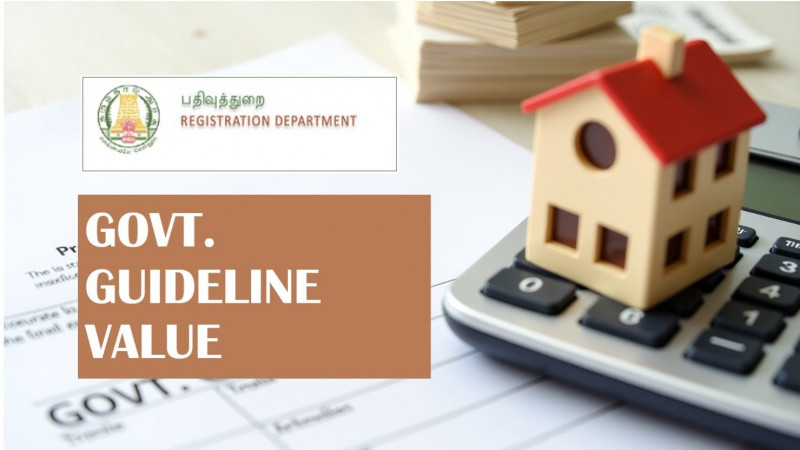- May 21, 2025
-
Understanding Government Guideline Value in Property Transactions
In the world of real estate, knowing the market value is important—but understanding the government guideline value is essential. It’s more than just a number—it’s the legal floor price for your land or building and plays a vital role in everything from stamp duty to resale value.
Whether you're a buyer, seller, or investor, here’s everything you need to know about guideline value in Tamil Nadu and how to navigate it smartly.
Why Is Guideline Value Important?
The guideline value (also called circle rate or ready reckoner rate) is the minimum value set by the state government for property registration. You can register above it—but never below.
Key Purposes of Guideline Value:
- Sets a base for stamp duty and registration charges
- Helps curb underreporting of property value
- Brings transparency to real estate transactions
- Serves as a valuation reference for loans and taxation
🧠 Fun Fact: The value is revised periodically based on local development, demand, and infrastructure projects.
How to Check Govt. Guideline Value in Tamil Nadu
Thanks to digitization, it’s super easy to check property rates in Tamil Nadu.
Step-by-Step Guide:
- Visit the official TN registration portal:
- 👉 https://tnreginet.gov.in
- Navigate to “Guideline Value” under the “More” or “E-Services” menu
- Enter:
- Zone and Sub-Registrar Office (SRO)
- District, Taluk, and Village
- Survey Number or Street Name
Click Submit to view the guideline rate per square foot/metre/acre
Things to Note:
- The guideline value differs based on location, street, survey number, and land classification (residential, agricultural, commercial)
- Rates may vary significantly between neighboring plots depending on development
Can You Register Land Above the Guideline Value?
Yes—and in many cases, you should.
Why Register Above Guideline Value?
- Reflects true market value
- Useful when getting higher home loans
- Shows accurate asset worth in legal records
Important Points:
- Stamp duty & registration fees will be calculated on the higher declared value
- Under-declaring value to avoid tax can lead to penalties or legal action
- Keep valuation reports or real estate appraisals ready when registering at market rates
⚠️ Always consult a legal advisor if the market rate is much higher than the government guideline value.
Strategic Tips for Real Estate Investors
Want to make smart moves in property investment? Here’s what to keep in mind:
✅ 1. Compare Market vs. Guideline Value
- Use real estate portals like MagicBricks or 99acres for market rates
- Use tnreginet.gov.in for guideline value
- If market value is much higher, expect higher registration fees—but also higher resale potential
✅ 2. Document Everything
If registering above guideline value, retain:
- Sale deed with actual price
- Valuation report from licensed appraiser
- Tax receipts, Patta, FMB sketch, EC
✅ 3. Stay Ahead of Government Updates
- Government may revise guideline values based on town planning projects, metro lines, or SEZs
- Keep an eye on local development news for emerging hot spots
🔍 Example: After a new highway announcement, areas along the route may see both market and guideline values increase.
📊 Table: Difference Between Market Value & Guideline Value
FAQs –
Government Guideline Value in Tamil Nadu
Q1: Can I sell my land below guideline value?
No. Registration must be at or above the guideline value. Undervaluing the sale can lead to rejection or legal penalties.
Q2: How often are guideline values updated?
Generally every few years by the state government, but sometimes more frequently in high-growth zones.
Q3: Does guideline value apply to agricultural land too?
Yes, but rates differ based on classification, so make sure you select the correct land type while checking.
Q4: Can I dispute the guideline value?
Only in rare cases and through legal petition or government representation, typically when the rate is outdated or incorrect.
Summary: Know the Value Behind the Deal
The government guideline value isn’t just paperwork—it’s the legal benchmark that shapes the financial, legal, and tax aspects of your property deal. Whether you’re registering a property, applying for a loan, or simply verifying value before buying, understanding how guideline values work can save you time, money, and trouble.
📍 Pro Tip: Cross-check both market price and guideline value—then make your move with complete clarity.


Comments :
Currently, there are no comments in this post. Be the first person to comment on this post.